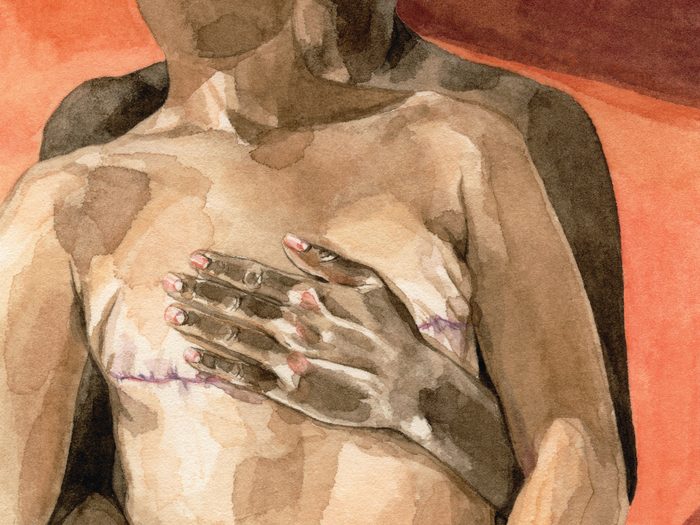How to Embrace Your Sexuality After a Diagnosis

We spoke to Dr. Lauren Walker, a researcher who specializes in people with cancer and sexuality, all about sex after a cancer diagnosis.
Lauren Walker likes to talk about things that can make other people squirm—especially sex, cancer and sex after a cancer diagnosis.
Walker, an adjunct associate professor at the University of Calgary, is a clinical psychologist and a researcher who specializes in helping people with cancer and their partners prioritize sexuality during and after cancer treatment. (Take note: That’s sexuality, not sex, because a satisfying sexual life means more than just the act.) She’s the co-author of the book Androgen Deprivation Therapy: An Essential Guide for Prostate Cancer Patients and their Loved Ones.
Walker runs her own smart and sassy Instagram account, @drlaurenwalker. It’s full of relatable sex and relationship advice, with the odd glimpse into her own life as a sex therapist and a mom to a child and a dog. For instance, after her daughter asked if she could have a sticker of a penis, Walker posted that she wasn’t entirely sure how she’d explain that one to her childcare provider. Sometimes things are hard to talk about even for the expert.
Here are some of Walker’s tips for how to embrace your sexuality after a diagnosis of cancer.
(Related: The Honest, Expert-Backed Truth About Having Sex While on Your Period)
Make it a priority
It’s easy to diminish the importance of sexuality and sex in the context of cancer. People often feel like they have far more pressing health concerns after their diagnosis. Some worry that sex might not be good for their body, or they don’t know how they can comfortably have sex during treatment. But sexuality is a valid and vital part of quality of life—and it’s likely to be affected by cancer and its related treatments, says Walker. “An important thing about sensation post-cancer is that it may change, so you have to figure out what works for you now compared to before,” she says.
You can still experience sexuality even if you’re not up to sex
Walker says people often assume that if they’re not sexually active or haven’t been for a while, they’ve become non-sexual. That’s wrong, she says. Experiencing sexuality can be as simple as getting kind of turned on by a steamy scene in a movie: you don’t have to do anything about it. Walker encourages her clients to think more broadly about what it means to enjoy sexuality—consider things like dressing up, dancing, eating and listening to music.
(Related: First Person: How Losing My Tongue to Cancer Helped Me Find My Voice)
Don’t be afraid to talk to your health-care provider about sex
People skip the sex talk with their doctors when they’re going through cancer treatment. Sure, sex can take a back seat to things like chemotherapy, surgery and symptom management. But your sexual relationships are likely to be affected by the disease or its treatment, depending on your condition. Don’t let feeling awkward stop you from bringing it up with a health-care provider, she says. That’s their job.
You don’t have to figure this out alone
Walker recommends people diagnosed with cancer and their partners check out the Canadian Cancer Society’s booklet on cancer, sex and intimacy. She also gives high marks to sexuality counsellor Anne Katz’s books on cancer and sexuality.
(Related: Sex After 40: The Shocking Truth No One Talks About)
Learn how you can be a supportive partner
Cancer affects both people in a relationship. If your partner is diagnosed with cancer, offer reassurance and encouragement. Talk about sex, and listen to them. Navigate the options for sexual concerns together. Seek out ways to be intimate that are meaningful for you both but don’t necessarily involve sex.
(Related: How I Used 7 Communication Tips to Improve My Relationship)
Just getting naked with your person can be rewarding
Maybe sex is not a priority right now. That’s fine. But there’s still a benefit to having your body being touched by your loved one’s body. Take time to enjoy skin-to-skin contact with no other purpose in mind—not as a prelude or a postscript to sex. “There’s a real intimate connection that is built through that skin-on-skin activity,” says Walker.
Relish the ways the body demonstrates strength and resilience
Cancer often leads to difficult changes in a person’s body—things like pain, weight loss or gain, scarring and fatigue. Breast cancer may mean the loss of a breast, while prostate cancer treatment could result in incontinence. These side effects can diminish a person’s confidence and comfort in their body. Walker advises her clients to try to focus on appreciating the power in their physical bodies. People who have any illness tend to feel prouder when they pay attention to the things their bodies have overcome rather than dwelling on loss. “That’s a good indicator of resilience and confidence,” she says.
Stop making orgasm the goal
Intercourse might not be on someone’s wish list, especially if they’re recovering from chemotherapy or surgery. And that’s fine, says Walker. Humans don’t need to engage in genital-oriented sexual activity to experience intimacy or comfort. Walker encourages cuddling, kissing and fondling in a non-goal-oriented way to see what both partners are comfortable with. “It’s about challenging [the idea] that sex needs to be penetrative and needs to end in orgasms,” she says.
(Related: 3 Ways Your Sex Life May Change at Midlife)
Make sure there’s a reward in sex for you
Whatever sexual experience you’re having, make sure there’s a benefit for you. The reward might be something different in the context of cancer compared to before. For example, it could be physical pleasure, emotional connection to a partner, feeling empowered or feeling attractive, or something to help you fall asleep. “Make sure there is something there that you stand to gain from the effort you’re putting in,” says Walker.
Set time aside for sexual experiences
Walker often tells clients that if they’re looking for sexual desire to arrive like a lightning bolt, they might be waiting a long time. Hormones are changing. People are busy. Stress levels are high, especially when someone is sick. Block off time for sexual experiences. Walker says couples who make a conscious effort to prioritize sexual experiences tend to maintain their sexual relationship. (That’s true all the time—not just after a cancer diagnosis!)
If you’ve experienced pain with penetrative sex but are motivated to have it, there are ways to treat it
Walker suggests those who experience pain with penetration play with milder, less invasive sexual activity, and in time, they might want to have penetration. In those cases, she recommends clients see psychologists and/or pelvic floor physiotherapists. But she can’t say this enough: People have very enriched, satisfying sexual lives without penetrative activity. You don’t need it.
Next, Samantha Bitty Knows Good Sex (and Wants You to Know It, Too)




